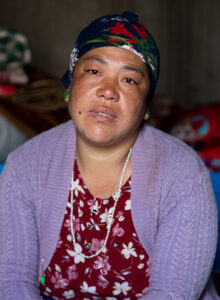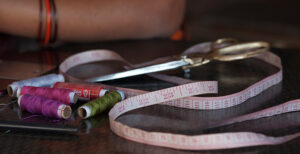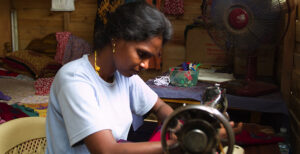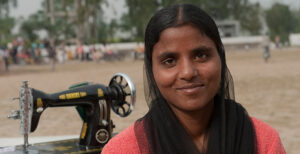Raise funds for Sewing Machines
There are many ways you can fundraise, whether it’s a bake sale, a marathon, or a party!
This website will offer limited functionality in this browser. We only support the recent versions of major browsers like Chrome, Firefox, Safari, and Edge.

Like this woman, Maemi worked hard to provide for her family but often fell short.
Maemi’s life hadn’t always been full of turmoil. She hadn’t always been so burdened by the cares of life. She had married at the age of 20, likely with hopes of a happy life in her husband’s home. Devoted to her traditional religion, Maemi regularly practiced rituals and prayed to local deities.
Soon, the couple was blessed with a child, and they welcomed their first daughter into the world. Two years later, Maemi gave birth to another girl, and that’s when Maemi’s troubles began.
The family was upset. Another girl?
Often, parents in their culture had a strong preference for sons. A son would bring wealth into the family and care for his parents in their old age. A daughter, on the other hand, would cost the family an expensive dowry and leave them once she got married.
Perhaps in despair, Saeran stopped working. The burden of providing for their family fell to Maemi. Troubled by her circumstances, Maemi was determined to do something. She had sewing skills and managed to find a tailoring job. Her paltry earnings were insufficient to meet all their needs, but she continued to fight for their survival, one stitch at a time.
But Maemi seemed to be fighting a losing battle. Her efforts to provide fell short, and they only garnered opposition. There was no peace in their home, only disappointment. Maemi’s mother-in-law, Gabija, recoiled at the thought of her working outside the home.
In their culture, some people felt a woman should seek only to be a good wife and mother, not seek employment elsewhere. Besides, such employment took Maemi away from the home, leaving her with less time to work around the house. A daughter-in-law was expected to submit to her in-laws and help with household chores—it was her duty.
Gabija admonished Maemi to quit her tailoring job. Perhaps she feared what her neighbors might think, what they might say. Perhaps she feared embarrassment or shame. Perhaps she simply thought Maemi should focus on her duties at home.

Armed with sewing skills, Maemi (not pictured) fought for her family’s survival.
But what could Maemi do? It was her duty as a wife and mother to ensure her family ate. If that meant working a tailoring job, that’s what she would do. Unfortunately, her determination added to her woes as it incurred Gabija’s wrath. In anger, Gabija ripped away the roof over their heads. Asked to move out of the family, Maemi, her husband and their children found a house nearby to rent. But how would they afford the extra expense?
The weight of Maemi’s worries likely seemed heavier by the day. She frequented local temples, offering fervent prayers and rituals, seeking peace. But still she strained under her burdens. Somehow, she must carry on. Was she all alone? Was there anything or anyone who could help?

GFA pastors like Pastor Silas and the one pictured show Christ’s love in word and in deed by helping people in their communities with various problems they face.
One night, perhaps as she tossed and turned in her bed, Maemi had a dream. Or was it a vision? Maemi heard a voice saying, “Come to me, my daughter. I will give you peace and joy.”
Peace and joy? These were the very things she sought! But who was it speaking to her? Was it real or a figment of her imagination?
Somehow Maemi knew: It was real, and it was the Lord Jesus Christ.
Questions must have flooded Maemi’s mind. She needed answers. She needed to know more about this One who could provide peace and joy. Maemi began to search for a church and found a local pastor. She shared her family problems and her dream. Finding answers, Maemi put her trust in Christ and began to follow the Prince of Peace.

Like this woman, Maemi sews for a living. Thanks to the sewing machine Maemi received from GFA World, she can provide for her family from her own home.
Later, Maemi joined a church led by GFA pastor Silas, who observed Maemi’s hard work and her desire to provide for her family. Pastor Silas also saw an answer to Maemi’s dilemma. He arranged for her to receive a sewing machine through a GFA gift distribution. Maemi already had the skills. Having her own sewing machine would enable her to earn a living from her very own home. Gratitude for this blessing flooded Maemi’s heart.
God used this blessed sewing machine to bring transformation to Maemi’s family. Not only did it provide a sustainable source of income, it also provided visible evidence of God’s love. Saeran noticed the changes in his wife. Her strong faith inspired him. The blessings and peace he witnessed in their family encouraged him. Saeran put his faith in Christ as well, and his heart began to change. Saeran started working again. Now the couple work together to provide for their family as, together, they follow Christ.

You can give a simple, life-changing gift to a woman in need.
There are many other women who struggle to provide for their families. They may be widows. They may have husbands who can’t or don’t work. They may work alongside their husbands for two meager incomes that still don’t cover their family’s basic needs.
A sewing machine enables such women to earn a sustainable income from the safety of their own homes. It enables them to care for their families and ensure their needs are met. It empowers them to rise above cyclical poverty, one stitch at a time.
The simple, practical gift of a sewing machine also demonstrates Christ’s love. You can help empower women to provide for their families and show them Christlike compassion by providing one.
There are many ways you can fundraise, whether it’s a bake sale, a marathon, or a party!